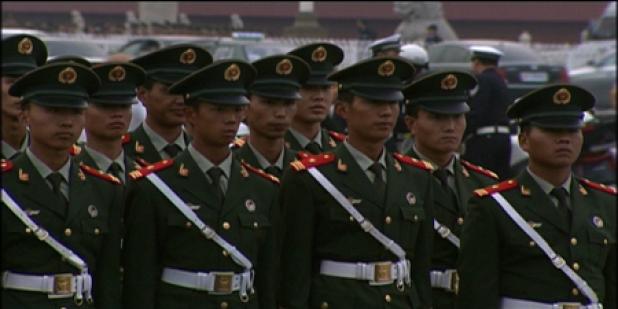Join us for a free one-day workshop for educators at the Japanese American National Museum, hosted by the USC U.S.-China Institute and the National Consortium for Teaching about Asia. This workshop will include a guided tour of the beloved exhibition Common Ground: The Heart of Community, slated to close permanently in January 2025. Following the tour, learn strategies for engaging students in the primary source artifacts, images, and documents found in JANM’s vast collection and discover classroom-ready resources to support teaching and learning about the Japanese American experience.
Human Rights: Part 3 of Election ’08 and the Challenge of China
Concerns about human rights pervade American discussions about China. Human rights is the focus of the third segment of the USC U.S.-China Institute's documentary on the 2008 election and U.S.-China relations.

Click here to go to the main Election '08 and the Challenge of China page.
Chinese today enjoy great freedom in their everyday lives, but Americans of all political leanings express concern about China’s human rights record. The Chinese government’s suppression of demonstrations and riots in and near Tibet in March again focused attention on the issue, as did restrictions on demonstrations during the Olympic Games. Like his predecessors, President George W. Bush has met with Chinese political, religious, and labor rights activists and has called on Chinese authorities to do more to secure basic liberties. These criticisms and those of Bush’s predecessors seem to have had limited impact.
This video is also available on the USCI YouTube Channel.
Speakers in this segment include:
Richard Armitage, president, Armitage International and advisor to John McCain; former Deputy Secretary of State
Jeffrey Fielder, labor activist; formerly of the U.S.-China Economic and Security Review Commission
Kenneth Lieberthal, professor, University of Michigan; former Senior Director for Asia, National Security Council
Clark T. Randt, Jr. , U.S. Ambassador to China
J. Stapleton Roy, managing director, Kissinger Associates and director of the Kissinger Institute on China and the United States at the Woodrow Wilson Center, former Ambassador to China and Assistant Secretary of State for Intelligence and Research
Additional resources:
Documents
U.S. State Dept., International Religious Freedom Report 2008
Congressional Research Service, Tibet: Problems, Prospects, and U.S. Policy, April 10, 2008
U.S. State Dept., "Human Rights in China," March 11, 2008
PRC State Council, "Human Rights Record of the United States in 2007," March 13, 2008
PRC State Council White Paper, "China's Political Party System," November 15, 2007
PRC State Council White Paper, “China’s Progress in Human Rights in 2004,” 2005
Organizations
USCI and US-China Today Articles
Damon Ferrara, "Mary Gallagher: The Rule of Law in China," Feb. 14, 2008
Edward Friedman, "Commentary: PR Meltdown, What Went Wrong for Beijing," June 20, 2008
Edward Friedman, "Waiting for Democracy - and Waiting," April 2007
Andrew Nathan, "Political Culture and Democratic Legitimacy in East Asia," April 2007
Kevin O'Brien, "Discussing 'Prospects for Political Reform,'" April 2007
Please contact Clayton Dube at the USC U.S.-China Institute (1-213-821-4382 or cdube@usc.edu) with questions about the documentary and its themes or screening inquiries. The documentary is also available at the USC U.S.-China Institute’s channel at YouTube.
Featured Articles
Please join us for the Grad Mixer! Hosted by USC Annenberg Office of International Affairs, Enjoy food, drink and conversation with fellow students across USC Annenberg. Graduate students from any field are welcome to join, so it is a great opportunity to meet fellow students with IR/foreign policy-related research topics and interests.
RSVP link: https://forms.gle/1zer188RE9dCS6Ho6
Events
Hosted by USC Annenberg Office of International Affairs, enjoy food, drink and conversation with fellow international students.
Join us for an in-person conversation on Thursday, November 7th at 4pm with author David M. Lampton as he discusses his new book, Living U.S.-China Relations: From Cold War to Cold War. The book examines the history of U.S.-China relations across eight U.S. presidential administrations.




